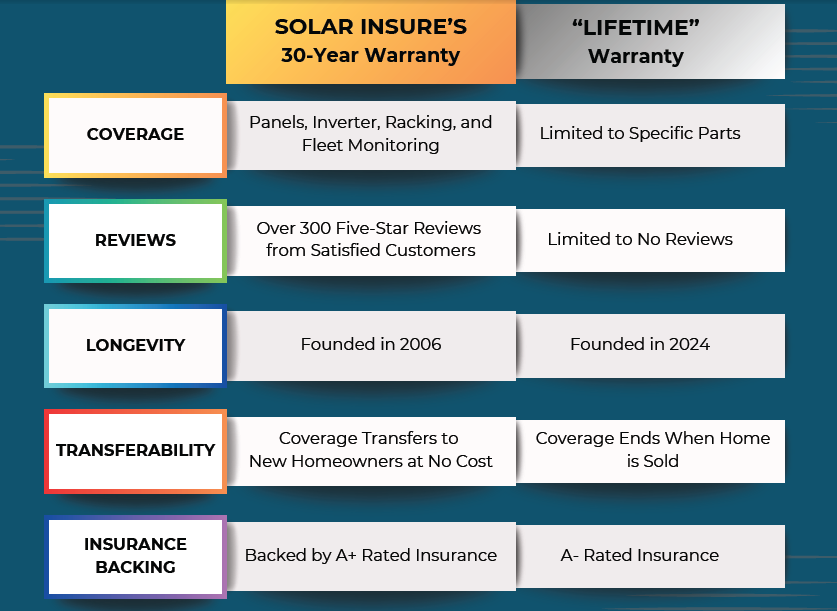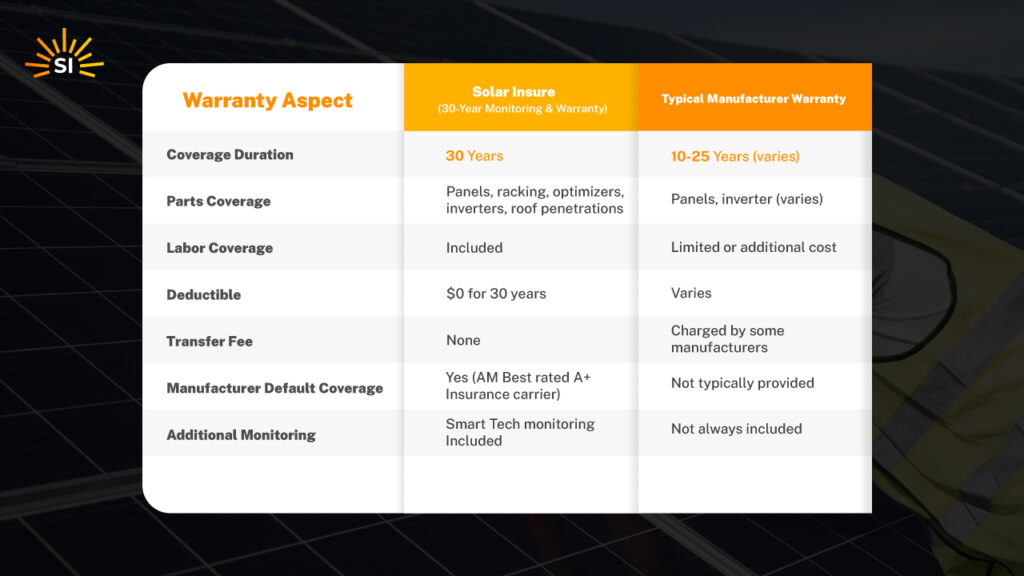
The solar industry has experienced significant growth in recent years, but it has also faced challenges, including the unfortunate trend of solar companies going out of business.
This has left many homeowners with defunct warranties, as their installer is no longer operating. Some companies have disappeared overnight, leaving customers without recourse for warranty claims or support.
This stark reality highlights the importance of working with a reputable and reliable solar partner. That’s where Solar Insure certified partners come in. Solar Insure thoroughly vetted and approved these contractors and offers a comprehensive 30-year monitoring and insurance-backed warranty package to protect your solar energy system.
In contrast, companies without Solar Insure certification may pose a greater risk to homeowners, even if they offer a “lifetime warranty” that is not transferable. By choosing a Solar Insure certified partner, you can ensure a safe and secure investment in your solar energy system.
A lifetime warranty on a solar energy system might seem like a great deal, but it’s essential to examine the terms and conditions closely.
When considering a non-transferable lifetime warranty for your solar energy system, consider the potential impact on your home’s resale value.
A non-transferable warranty might make your home less attractive to potential buyers, affecting its selling price.
Table of Contents
Limitations of Lifetime Solar Warranties
One of the most significant limitations of lifetime solar warranties is their non-transferability. If you sell your home, the warranty does not transfer to the new owner, leaving them with no warranty coverage.

This can be a major concern for homeowners who plan to sell their home in the future, as a non-transferable warranty can significantly reduce the value of their solar energy system.
In contrast, transferable warranties offer a much more attractive option for homeowners. They provide peace of mind and added value to their solar energy system even after they sell their homes.
Considering a solar warranty for a solar energy system is an important decision. Here are several potential issues and considerations you should be aware of regarding lifetime warranties, especially for such significant investments:
- Definition of Lifetime: Clarify what “lifetime” means in the context of the warranty. Does it refer to the expected lifespan of the solar panels or other components, or is it tied to the company’s operational lifespan? This can significantly affect the actual duration of the warranty.
- Coverage Scope: Understand exactly what the warranty covers. Does it include all components, such as solar panels, inverters, and mounting hardware? What about labor costs for repairs? Be aware that certain critical parts, like inverters, often have a shorter lifespan than the panels.
- Exclusions and Limitations: Lifetime warranties typically have exclusions. For solar systems, these might include damage from environmental factors, improper installation, or lack of maintenance. Ensure you know what is not covered.
- Non-transferability: Since the warranty is non-transferable, it only applies while you own the property. This limitation can affect the resale value of your home, as the warranty benefits do not extend to the new owner.
- Company Viability: The value of a lifetime warranty depends on the offering company’s longevity and financial stability. If the company goes out of business, the warranty might be voided.
- Claim Process: Understand the process for filing a claim under the warranty. Is it straightforward? Are there any fees involved? Sometimes, the complexity and cost of claiming under a warranty can diminish its value.
Before proceeding with your purchase, it is beneficial to compare this offering with others that have transferable warranties or consult with a legal or financial advisor to fully understand the implications of the warranty terms.
Solar Insure’s 30-Year Transferable Warranty: A Better Option

Solar Insure’s 30-year transferable warranty addresses consumers’ concerns with the lifetime warranty.
Here’s why:
- Transferable: This warranty can be transferred to new homeowners, increasing the value of our investment.
- Long-term coverage: 30 years is significant, providing protection for most of the system’s lifespan.
- Fleet monitoring: Solar Insure’s warranty covers the system with labor, not just specific parts.
- Reduced risk: With a transferable warranty, we’re less concerned about the warranty provider’s longevity.
- Insurance backed – The Solar Insure warranty is backed by an AM Best A+ Rated insurance carrier.
Conclusion
While a lifetime warranty might seem attractive, its limitations and non-transferable nature make it less desirable. Solar Insure’s 30-year transferable warranty offers more comprehensive coverage, reduced risk, and increased flexibility. As most homeowners plan to sell their house within 7-10 years, a transferable warranty is a better fit for your situation.



